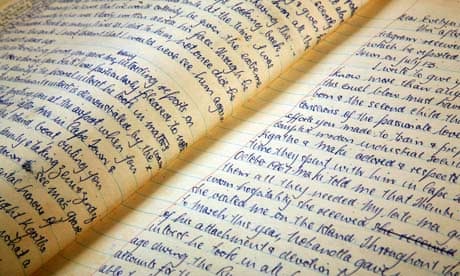"My Darlings," begins the neat blue script. "Once again our beloved Mummy has been arrested and now she and Daddy are away in jail. My heart bleeds as I think of her sitting in some police cell far away from home, perhaps alone and without anybody to talk to, and with nothing to read. Twenty four hours of the day longing for her little ones."
The letter was written from prison on 23 June 1969 by Nelson Mandela to his daughters, Zeni and Zindzi, after their mother, Winnie, had been detained by apartheid-era police. Now, in Mandela's original handwriting, complete with crossings out and corrections, it can be read for free by anyone with internet access.
The poignant missive is among more than 1,900 documents, photographs and films of South Africa's first black president that were published online on Tuesday by Google and the Nelson Mandela Centre of Memory.
The digital treasure trove ranges from Mandela's church membership cards from the 1920s and 30s to the warrants of committal that sent him to jail; from the earliest known photo of his cell on Robben Island to prison and presidential diaries. The multimedia website allows users to zoom in on his desk calendars where handwritten notes chronicle his daily life as an inmate – the entry for 13 December 1989 shows that he and President F W de Klerk met for the first time and talked for two and a half hours.
Drafts of Mandela's manuscripts for the sequel to his autobiography, Long Walk to Freedom, are made public for the first time on the site. There are also notes that he made while leading the negotiations that ended apartheid, and rare photographs, such as Mandela sitting with Yasser Arafat and Muammar Gaddafi.
In a video segment, archbishop emeritus Desmond Tutu recalls the day that the lodestar of the struggle was elected president of a newly democratic South Africa: "Apartheid, injustice, oppression had been comprehensively defeated and now we were free. God if I die now, I won't mind! I said, 'This is the day we have waited for for 300 years. This is our brand-new out of the box president', and the cheers were earsplitting as I raised Madiba's [his clan name] hand as if he had been a boxer who has just won a boxing match. What a moment!"
The centre of memory received a $1.25m (£782,000) grant from Google last year to help preserve and digitise thousands of archival documents, photographs and videos.
At a launch event in Johannesburg, the statesman's granddaughter, Ndileka Mandela, praised the initiative. "I think it's just awesome," she told the Guardian. "Grandad is all about equipping the young generation. This taps into the social networks in a way children can relate to and that's incredibly important. And it's free: they don't have to pay.
"It's a living and breathing document and for generations it will be there in perpetuity. There are letters that go to the essence of his soul and how he felt."
Ndileka rejected suggestions that the publication of the 93-year-old's papers to a global audience could be an invasion of his privacy. "Madiba has always been portrayed as a political figure. It's time people knew him as a man with aunts and uncles and other family members. Not only he suffered, but his family suffered too."
The archive includes a 1976 letter written by prisoner Ahmed Kathrada that was smuggled out of Robben Island.
Kathrada, 82, said on Tuesday: "It's a fantastic project. It's a tremendous way of preserving the history. Madiba has always emphasised that he was part of a collective so it will give him great satisfaction that it includes other people. It's the beginning and we hope to see a lot more."
Jack Swart, a prison warder who was Mandela's cook in the year before his release, said: "There are many things people don't know about him and the people who worked with him. There are many finds still to tell."
Mandela was briefly admitted to hospital last month for minor diagnostic surgery to determine the cause of an abdominal complaint. He is no longer politically active and was last seen in public in July 2010. But the centre of memory insisted the material had been published with his knowledge and approval.
The head of its memory programme, Verne Harris, said: "We avoid bothering Madiba these days, but we discussed with him over several years the issues of public access to these materials."
He added: "Madiba doesn't use a computer. Never has."
